Alex Alpharaoh’s powerfully raw and vulnerable performance about his life and DACA experience taught me that people battling DACA struggle on a daily basis. DACA fighters must constantly watch their backs and worry about every move they make, especially from law enforcement individuals, which harbors fear and distrust among a large portion of the U.S. Alpharaoh’s story is only one DACA story, but is an extremely important one to know in better understanding the negative impacts of DACA.
As he told his audience of the multiple obstacles he had to face, Alpharaoh’s constant struggle was more than apparent. Trying to receive a new passport took months, especially once he was arrested for “disturbing the peace.” Alpharaoh, however, simply walked outside and a police officer thought he was suspicious because Alpharaoh did not have identification on him. Among passport and legal barriers, however, Alpharaoh also faced some intense personal struggles.
When trying to decide whether to go back to Guatemala to receive an official passport, the main unknown question to Alpharaoh was whether he would be allowed back into the U.S. Alpharaoh just wanted to be able to get back home. Alpharaoh never had the stable assurance that any white U.S. citizen would face if traveling out of the U.S. I am confident that my father, being a white male, would have absolutely no problem getting through U.S. customs or Border Patrol if he wanted to travel to Guatemala for seven days. Alpharaoh, however, never had an instance of calm travel. From the minute he stepped onto his departing plane at LAX to finally landing back in LA and going through border patrol, Alpharaoh knew his whole life would be on the line. Alpharaoh could not even completely enjoy his time in Guatemala, because he was so concerned about what regulation Trump would enact, or if he would be arrested the second he stepped out of the plane returning home.
While I only briefly discussed some of Alpharaoh’s struggles with DACA, his uneasy journey to Guatemala was only a piece of his life puzzle. In reality, however, Alpharaoh and so many other non-U.S. born people constantly live a life of fear and anxiety. As long as the U.S. has yet to find any permanent and positive solution for immigrants, foreigners, and people involved with DACA, a large portion of this country will live in constant uncertainty.
